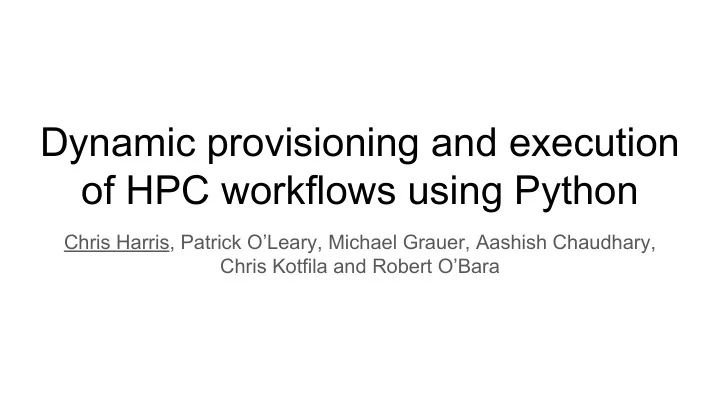

Dynamic provisioning and execution of HPC workflows using Python Chris Harris, Patrick O’Leary, Michael Grauer, Aashish Chaudhary, Chris Kotfila and Robert O’Bara
Overview ● Motivation ● HPC Workflows ● HPC Resources ● Cluster provisioning ● Data management ● Job submission ● Workflow orchestration ● Result/Applications ● Conclusion
Motivation ● HPC workflows have enabled significant research advances ● Barriers to widespread adoption remain ○ Complex to use ○ Require specialist local expertise ○ Expensive dedicated hardware
Cumulus ● Platform for dynamic provisioning and execution of HPC workflows ● Intended to make HPC workflows more accessible to developers ● Key functionality ○ Cluster provisioning ○ Data management ○ Job submission ○ Workflow orchestration
HPC Workflows ● Are tasks executed in order to carry out some computation on a HPC resource ● Jobs running on HPC resources ○ Simulation code ○ Data processing ● Auxiliary task run outside HPC resources ○ Transferring input data to HPC resource ○ Post-processing of results
HPC Resources ● “Traditional” HPC Resources ○ Dedicated hardware using sophisticated interconnects ● “Dynamic” HPC Resources ○ Built on demand from virtual server in public or private cloud ■ AWS EC2 ■ OpenStack ○ Size and characteristics tailored to workflow ○ Only pay for what you use ○ Interconnects are significantly slower
Design principles ● Hide complexity associated with HPC workflows ○ Application development rather than infrastructure ● Allow workflows to be portable across HPC resources ● Expose RESTful endpoints Language agnostic for clients ○
Cluster provisioning ● Launch and provision dynamic clusters tailored to a specific workflow ● Process composed of two steps ○ Launching ○ Runtime Provisioning ● Ansible ○ Automation tool for system configuration and software deployment ○ Declarative operations defined through ■ Reusable roles ■ Use case specific playbooks
Cluster provisioning - Launching ● Creating the virtual servers in the cloud environment ○ Tailor machine type and cluster size ● Machine images ○ Template from which virtual servers are created ○ Base operating system and software ○ Workflow specific images ■ Pre-installed software stack ■ Reproducible environment ■ Reduce cluster startup time
Cluster provisioning - Runtime provisioning ● Runtime configuration ○ E.g. configuration involving network topology ● Built-in support for MPI environment using SGE ● Additional playbooks can be added ○ E.g. Apache Spark.
Data management ● HPC workflows are data driven ○ Cluster and input configurations ○ Output dataset ○ Performance statistics ● Appropriate access controls needed ● Girder ○ Open-source web-based data management platform ○ Exposes RESTful endpoint ○ Provides cumulus with three key pieces of functionality ■ Data organization and access ■ User management and authentication ■ Authorization management
Job submission ● Cumulus using conventional job schedulers ○ SGE, PBS and Slurm (+NEWT) ● Provides a scheduler provides abstraction ● Access to HPC resources through SSH ○ Key-based authentication ○ Provides a secure and standard interface to a variety of ■ Public and private traditional HPC resources ■ Cloud based HPC resources
Workflow orchestration ● Combines the cluster provisioning, data management and job submission into a workflow ● Workflow topology ○ Simple linear flows ○ Complex flows containing branches and loops ● Efficient and scalable ○ Workflows are potentially very long lived ○ Consume minimal resources while monitoring HPC jobs
Workflow orchestration - TaskFlow ● TaskFlow - A simple yet powerful workflow engine built on Celery ● Celery ○ Open-source asynchronous task queue ○ Tasks are simple Python functions ○ Simple linear scaling
Applications - HPCCloud ● Web-based simulation environment ○ High-level workflows ○ Simple intuitive web UI ● Motivated Cumulus development ● Implements a number of workflows ○ PyFR simulations ○ ParaViewWeb visualization
Applications - ModelBuilder ● Computational Model Builder (CMB) framework ○ Advanced simulation workflows on the desktop ● Multiphysics workflows ○ Particle accelerator simulations ● Qt desktop application ○ API validation in non-web environment
Conclusion ● Cumulus is a novel platform for developing end-to-end HPC workflows ○ Targeting traditional and cloud-based HPC resources ● The platform provides ○ Cluster provisioning ○ Data management ○ Job submission ○ Workflow orchestration ● Its capabilities have been demonstrated in a variety of end-user applications
Recommend
More recommend